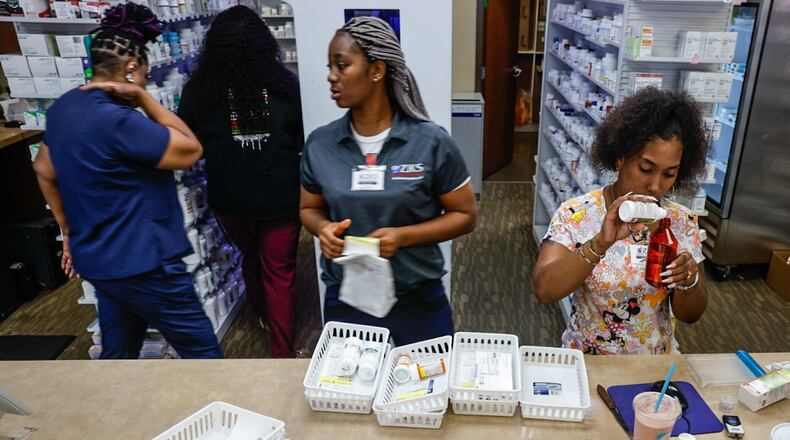“The phones keep ringing,” Ngoh said.
Most recently, Rite Aid announced it is closing all of its stores in Ohio, transferring prescriptions to Walgreens. There are 142 Rite Aid stores in Ohio, including a dozen in the Dayton region.
The Walgreens store in the Westwood neighborhood of West Dayton closed in April, with some local residents saying the move hurt an area they already called a “medical desert” with limited access to pharmacy and health care services.
Walgreens company leaders last summer announced that the chain planned to close 150 locations across the U.S. This decision was framed as a cost-cutting measure.
In 2022, CVS Health said It planned to close nearly 1,000 of its nearly 10,000 stores nationwide in 2022-2024. Local closures in 2022 alone included stores in Kettering, Moraine, Fairborn, Harrison Twp., Brookville and New Lebanon.
In 2019, five pharmacies in Butler, Darke and Montgomery counties closed between May and July of that year.
Ziks Family Pharmacy, an independent pharmacy with two locations in Dayton, is able to accommodate the influx of new patients for now, Ngoh said, but it could put a strain on the resources that are left in the community.
“We are concerned because if the pharmacies keep closing down, it makes it more difficult for the few of us around the area to satisfy everybody,” Ngoh said.
Closures risk customers’ health
Pharmacy deserts impact both rural and urban areas where there is limited or no access to pharmacies.
“This can be problematic for individuals who rely on medications to manage chronic conditions or have acute illnesses but struggle with social determinants of health (i.e. transportation, financial implications),” said Dr. Thad Franz, assistant dean of student affairs and professor of pharmacy practice in Cedarville University’s School of Pharmacy.
Pharmacy deserts can impact medication adherence and other health disparities, Franz said, leading to negative health outcomes.
Researchers have found the more vulnerable residents in a community may be the ones who lose the most.
Between 2009 and 2015, one in eight pharmacies closed, which disproportionately affected independent pharmacies and low-income neighborhoods, according to researchers associated with the University of Illinois at Chicago and Johns Hopkins University.
Credit: Jim Noelker
Credit: Jim Noelker
In urban areas, pharmacies serving disproportionately low-income, uninsured and publicly insured populations were at an increased risk of closure, according to the analysis, which was published in the Journal of the American Medical Association.
This was likely due to lower reimbursement rates for pharmacies from Medicare and Medicaid, researchers said. If pharmacies are not in preferred pharmacy networks, this could also lead to lower reimbursement rates for pharmacies.
Future remains unclear
With the future access of pharmacies being unclear, independent pharmacies committed to filling pharmacy deserts may be able to fill a gap in care.
The limited pharmaceutical access in one pharmacy desert in southwest Ohio led one graduate from a pharmacy fellowship at Cedarville University’s School of Pharmacy to pursue opening his own independent pharmacy.
Dr. Emmanuel Ayanjoke, originally from Nigeria, is a third-generation pharmacist who pursued a pharmacy fellowship at Cedarville before getting an opportunity from the pharmaceutical company McKesson.
McKesson was launching an initiative called Project Oasis, the goal of which is to tackle the rise of pharmacy deserts across U.S. The company provides funding for pharmacists to start their own facilities in areas without access to pharmaceutical care.
Ayanjoke was encouraged by his peers and mentors at Cedarville University to go after this opportunity.
“I’m incredibly grateful for the family I have in Cedarville,” said Ayanjoke. “I am surrounded by so many other pharmacists who have so much experience and knowledge. I know that in my new position at Altev, I can email any one of them for help or insight and they will be there. To have that kind of support is exceedingly rare.”
Altev Community Pharmacy, a McKesson-funded pharmacy of which Ayanjoke is now the owner and manager, opened in Avondale, a community in Cincinnati, in late April.
Cornelius Frolik and Jen Balduf contributed to this story.
About the Author



